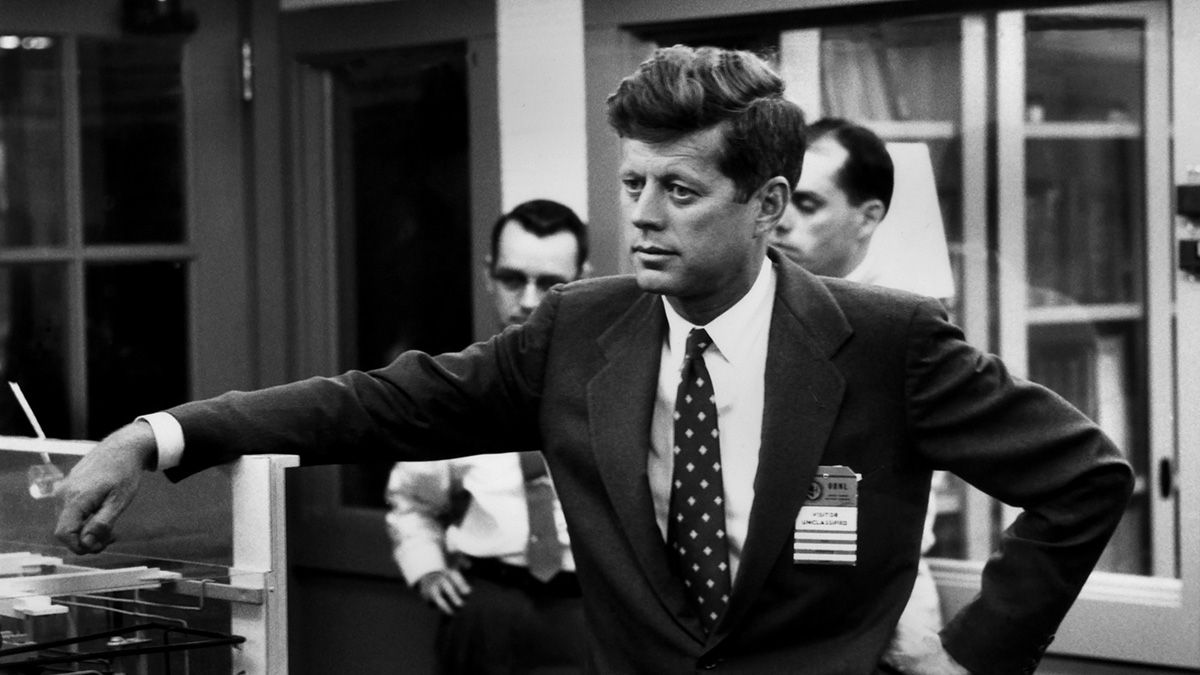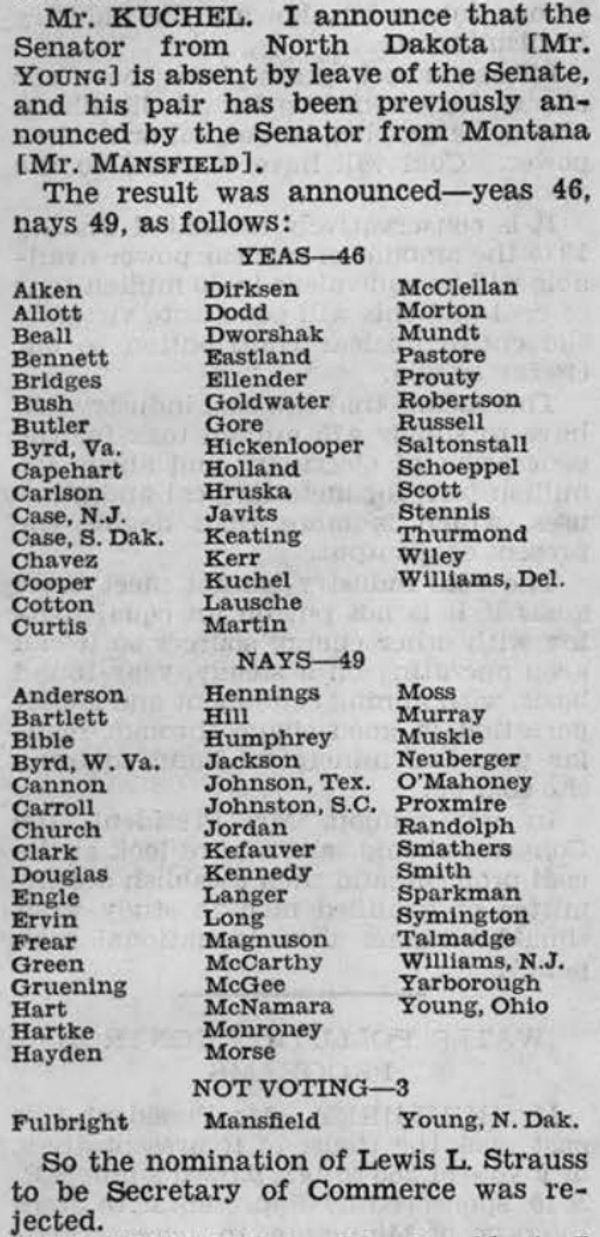Warning: This story contains some spoilers for Christopher Nolan's 2023 film, "Oppenheimer."
Readers who have seen Christopher Nolan's biopic about the life of physicist J. Robert Oppenheimer, credited by some as "the father of the atomic bomb," may have been curious about one scene that included a brief mention of a famous former U.S. president: John F. Kennedy.
Was the inclusion of Kennedy's name in relation to what was happening in the story a real historical fact? Did Kennedy truly vote against U.S. President Dwight D. Eisehower's cabinet nomination for Lewis L. Strauss, the former chairman of the U.S. Atomic Energy Commission, even after initially intending to vote in favor of him?
The answer was yes.
"Oppenheimer" was released in movie theaters on July 21, 2023. Strauss, a character who would eventually be revealed as Oppenheimer's nemesis and who helped engineer Oppenheimer's downfall, is portrayed by Academy Award-nominated actor Robert Downey Jr. As for Kennedy, he's only mentioned by name and does not appear onscreen.
During a pivotal scene toward the end of the film, Strauss, who had been serving under Eisenhower as acting U.S. secretary of commerce since November 1958, learns to his surprise that the senate nomination vote was not successful. This vote took place early in the morning on June 19, 1959.
In the film, Strauss is told that there were three holdouts, including Kennedy, a senator at the time for the state of Massachusetts.
On June 17, just two days before the vote, the Lewiston Daily Sun reported that Kennedy had reportedly originally intended to vote in favor of Strauss:
Another significant backstage development is that all the Democratic presidential aspirants are now definitely committed against Strauss.
In addition to [Senator Hubert] Humphrey, they are Senators Lyndon Johnson, Tex., John Kennedy, Mass., and Stuart Symington, Mo.
The three had been listed as undecided, with Johnson leaning against Strauss, and Kennedy and Symington for him.
Former President Truman is credited with winning over Symington.
Although appointing Strauss to the Atomic Energy Commission, Truman is now highly critical of him. Truman, a leading Symington presidential booster, had several telephone talks with his fellow Missourian, and apparently swung him against Strauss in the past week.
The reporting's mention of former U.S. President Harry S. Truman might bring to mind for "Oppenheimer" viewers the fact that he was portrayed in one scene, somewhat as an unpublicized surprise, by actor Gary Oldman. Oldman previously won the best actor Oscar for his role of another prominent figure in history – Winston Churchill – in the 2017 film, "The Darkest Hour."
"At 35 minutes past midnight, on June 19, 1959, in a packed Senate Chamber, the Strauss nomination died on a cliff-hanging roll-call vote of 46 in favor, 49 opposed," according to Senate.gov.
The official result was tallied as follows in the Congressional record:
About one week after the vote that denied Strauss his appointment, The Boston Globe published reporting about the rarity of the situation:
No Senate debate in recent history generated the political heat of that on the confirmation of Lewis L. Strauss as Secretary of Commerce.
In the early morning hours of June 19, Strauss became the eighth Cabinet nominee in history and the first since 1925 to be rejected by the Senate.
He was also the first nominee for any major post in the Eisenhower administration to be turned back by the Senate.
In Kennedy's letter to the Globe, which we were unable to find anywhere online other Newspapers.com, he expressed admiration of Strauss' "long public service," but said he had differences with "intense" efforts to lobby for votes.
The letter read, in part:
Why I Voted Against Him
By Sen. John F. Kennedy
This nomination was one of the most difficult questions to come before the Senate during recent years.
I tried to approach the issue with an open mind and I attempted to judge it on its merits.
I held no personal grievances against Adm. Strauss, since I have had a pleasant social aquaintance with him and since I admire some aspects of his varied and long public service.
However, the case against Adm. Strauss' confirmation for this position became stronger as it was considered more intensively.
I read large portions of the hearings before the Senate Interstate and Foreign Commerce Committee. That committee was disposed in Adm. Strauss' behalf two months ago.
However, the evidence presented by Adm. Strauss and by individual witnesses and the attitude which Adm. Strauss displayed regarding the constitutional relationship of the Executive and Congress and matters of public policy caused a sharp shift on that committee.
...
In the interval between the committee and the floor vote, members of the Senate were subjected to the most intense lobbying effort on Adm. Strauss' direct behalf that I can remember in some time.
All kinds of appeals and implied promises – many of them contradictory – were made to different senators.
This effort was properly resented not only by many Democratic senators, but also by several Republicans whose enthusiasm for Adm. Strauss' nomination dimmed considerably over the past weeks.
I think that this effort of garnering votes not only alienated some members of the Senate, but also cast considerable doubt on Adm. Strauss' freedom of action if he were confirmed.
I do not hold Adm. Strauss personally responsible for all of this activity, but it was undertaken with his knowledge and approval.
Later in the letter, Kennedy stressed the importance of what he contended was strong evidence on his side to oppose the nomination.
He ended his letter with, "I regret that the President insisted on Adm. Strauss' confirmation for this post after it became increasingly clear that he had lost the confidence of so substantial a segment of responsible opinion in the Senate and in the country."
Four years later, Kennedy had a hand in restoring Oppenheimer's reputation with his signing of a citation for Oppenheimer for the Enrico Fermi Award. The award was bestowed to Oppenheimer by U.S. President Lyndon B. Johnson on Dec. 2, 1963, just two weeks after Kennedy's assassination, USA Today reported.


